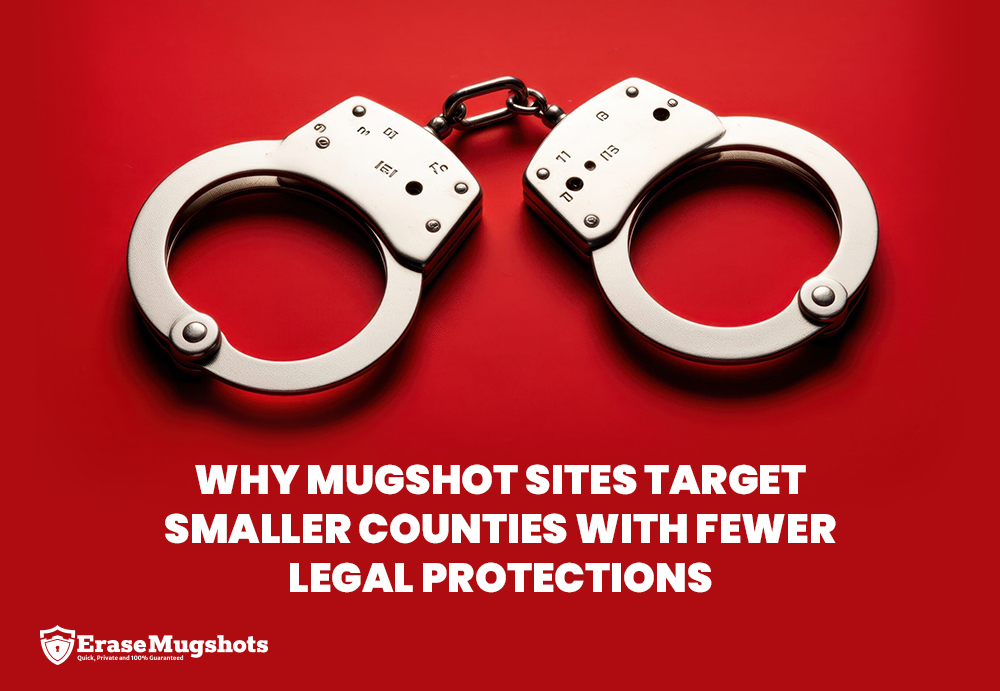100% Satisfaction Guaranteed
We offer a total mugshot removal solution to remove your mugshot and arrest details from the internet once and for all.

Table of Contents
Mugshot websites profit from public records. They collect arrest photos from local agencies, post them online, and often charge for removal. While this practice affects people across the country, smaller counties are especially vulnerable. Limited budgets, weak oversight, and gaps in legal protections leave many residents exposed to ongoing harm and exploitation.
Mugshot sites are online platforms that publish booking photos obtained from police or sheriff’s offices. Because these images are often treated as public records under state law, websites can request them without paying fees. These sites operate with minimal regulation and often prioritize profit over privacy, exploiting the public’s right to access information.
Once posted, mugshots can harm people even if charges are dropped or cases are dismissed. Employers, landlords, schools, and even health care providers may see the photo before learning the full story. This creates a cycle of stigma that is hard to escape, undermining an individual’s ability to secure employment, housing, or benefits. The consequences can be severe, impacting the person’s life, livelihood, and mental health.
Large counties often have lawyers, technology staff, and policies to limit misuse of arrest records. Smaller counties, however, may lack these resources and authority, leaving gaps that mugshot sites exploit. Limited budgets, minimal cybersecurity training, and weak enforcement mechanisms contribute to the problem.
Key factors include:
The result is uneven protection: a person in one county may face harsh online exposure, while another in a larger county may benefit from stronger privacy rules and legal protections.
The U.S. legal system provides several tools to challenge unfair practices related to mugshot websites, but applying these protections is complex and varies by jurisdiction.
Key statutes, such as Title VII of the Civil Rights Act, the Equal Protection Clause, and provisions in the United States Code, prohibit employment discrimination based on race, national origin, religion, sex, or disability. If a mugshot leads to employment discrimination, loss of health insurance benefits, or denial of housing, a person may have grounds for a legal claim under federal civil rights laws.
These laws protect employees and job applicants from unfair treatment in the workplace and ensure that employers cannot use arrest records to discriminate unlawfully. However, proving employment discrimination based on mugshot exposure requires gathering evidence and navigating complex legal processes.
The Constitution protects due process and equal protection under the law. Courts, including the Supreme Court, have ruled that government actions cannot unfairly burden certain groups. When county practices allow mugshots to be used in ways that harm fundamental rights—such as employment, education, or property rights—individuals may argue that those rights have been violated.
Exercising these constitutional rights often involves legal representation and may require a judge to decide whether a county or website’s conduct constitutes an undue hardship or violates fundamental protections.
Some state governments have enacted laws requiring mugshot sites to remove records upon request, especially when charges are dropped or cases are resolved without conviction. Others remain silent, leaving individuals with little legal recourse. This inconsistency makes the county or state of residence a critical factor in how exposed a person may be.
State laws may also impose obligations on mugshot websites to obtain consent before publishing images or to provide free removal options. However, enforcement varies, and many websites operate beyond the reach of local authorities.
When a mugshot appears online, the harm extends far beyond embarrassment or reputational damage.
These outcomes place the burden of proof on the individual to show that harm exists—a heavy task without access to legal counsel or resources to collect evidence and represent their interests effectively.
If your mugshot appears online, there are several important steps to protect your rights and reputation:
The debate over mugshot sites is about more than online shaming—it raises fundamental questions about civil rights, due process, and fair treatment under the law. When smaller counties lack the ability or resources to enforce rules, individuals bear the cost of exploitation.
Stronger legal protections are needed to:
Without these reforms, mugshot websites will continue to profit by exploiting gaps in the system—especially in communities with the least legal protections.
Mugshot sites thrive where oversight is weakest. Smaller counties, limited budgets, and uneven laws create openings that harm people long after an arrest. The solution lies in clearer federal law, stronger state protections, and access to fair remedies through the courts.
Until then, individuals must know their legal rights, seek trusted legal counsel, and take proactive steps to safeguard their reputation and legal protections. Understanding your rights and obligations and involving qualified parties, such as attorneys and judges, when necessary, can make a critical difference.
We offer a total mugshot removal solution to remove your mugshot and arrest details from the internet once and for all.